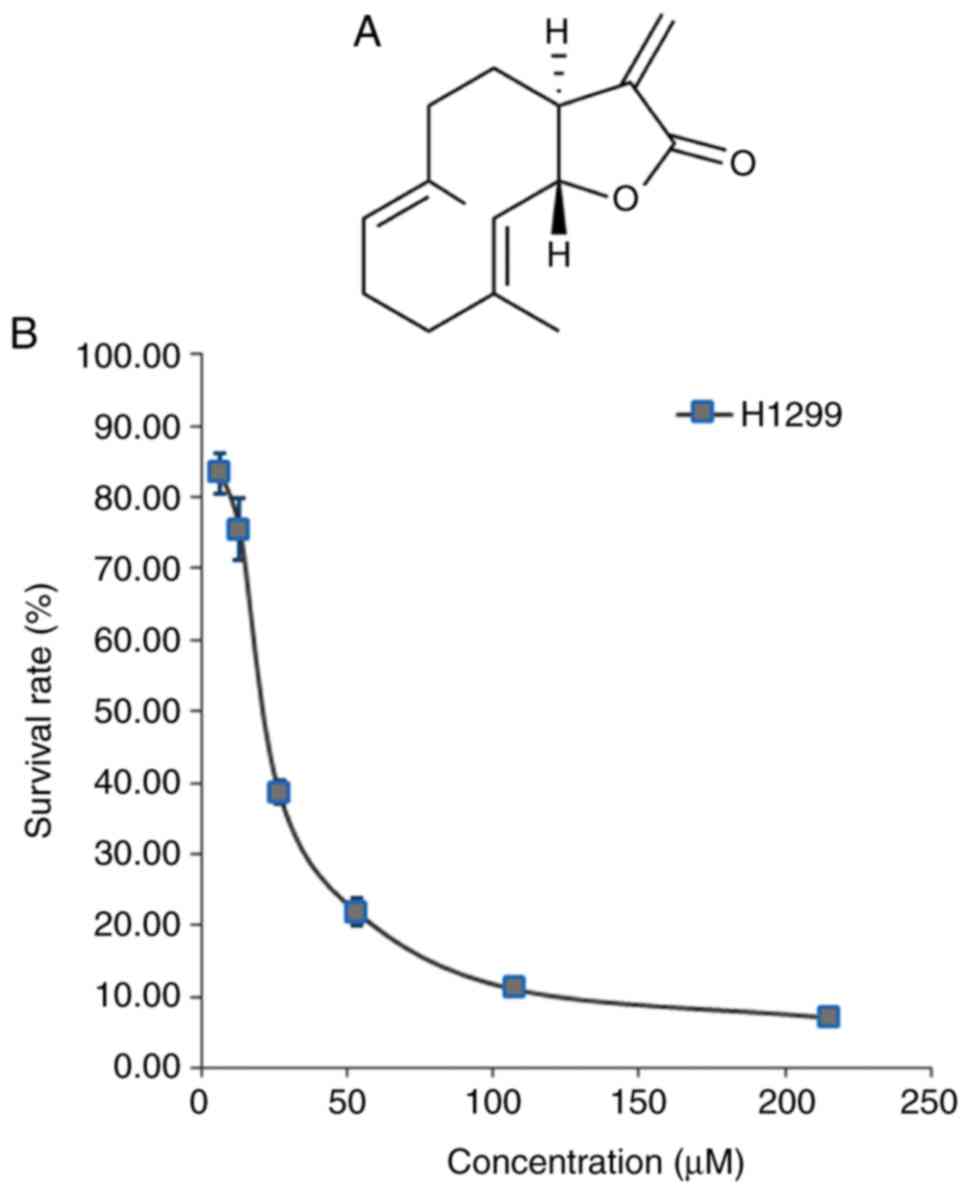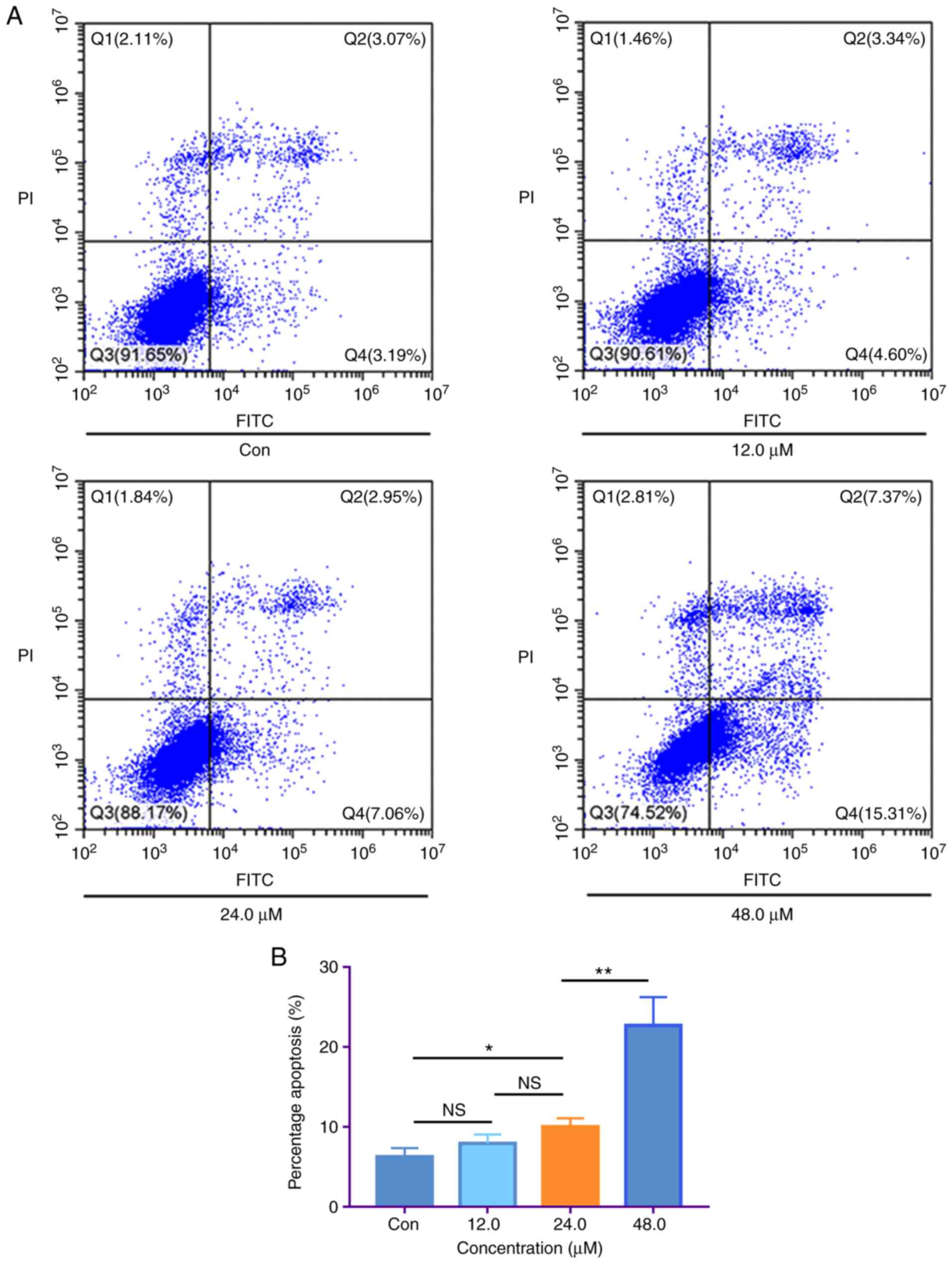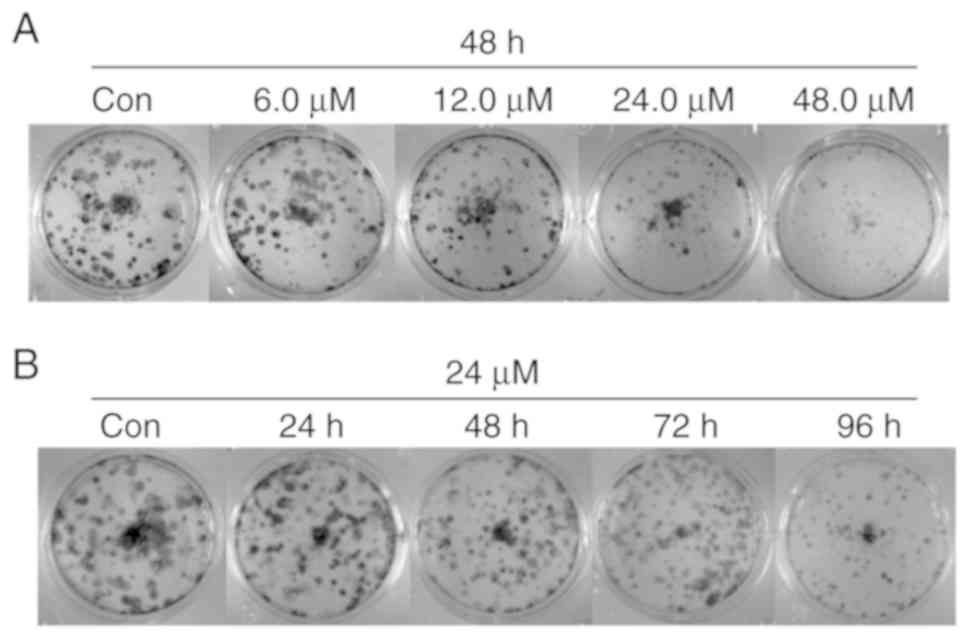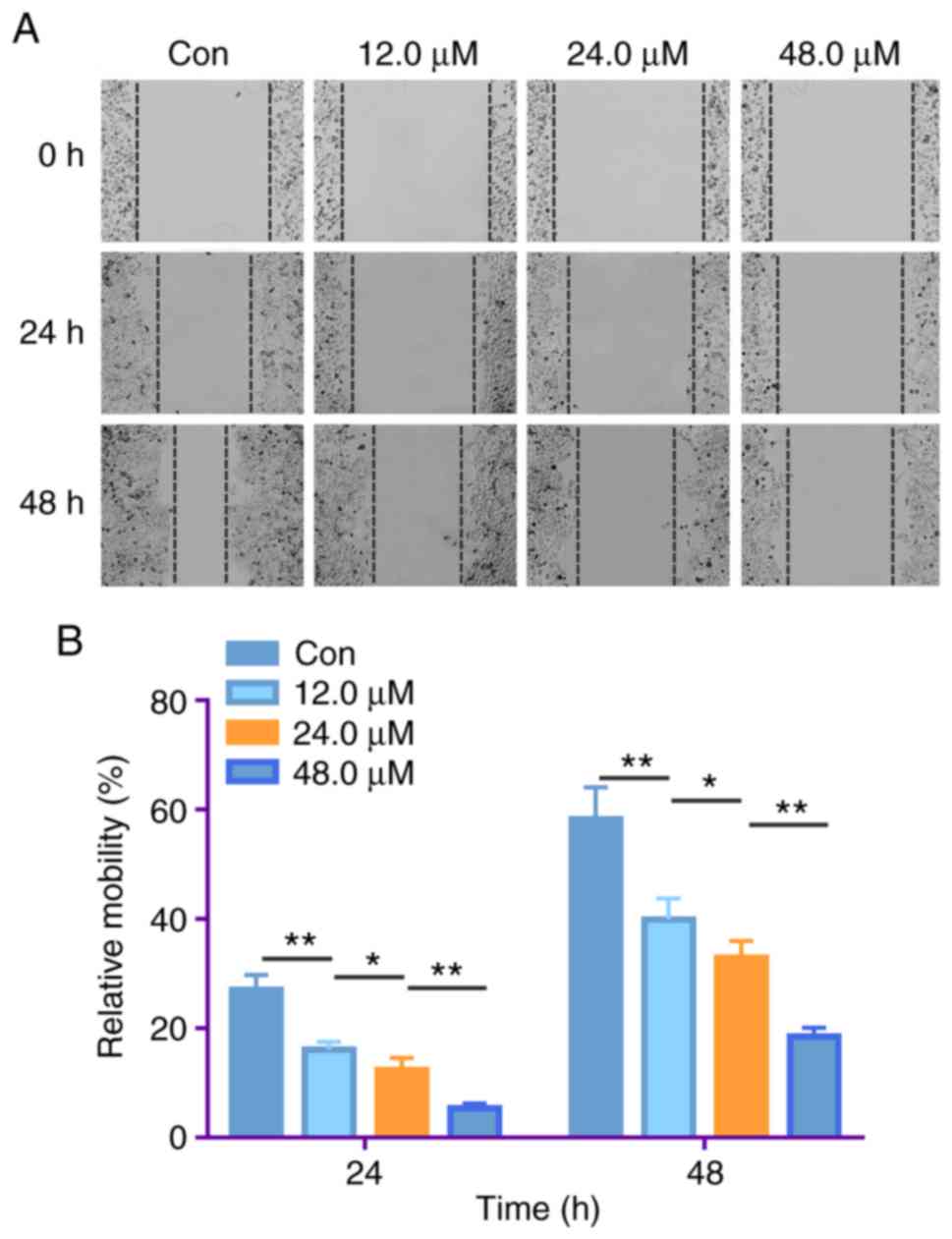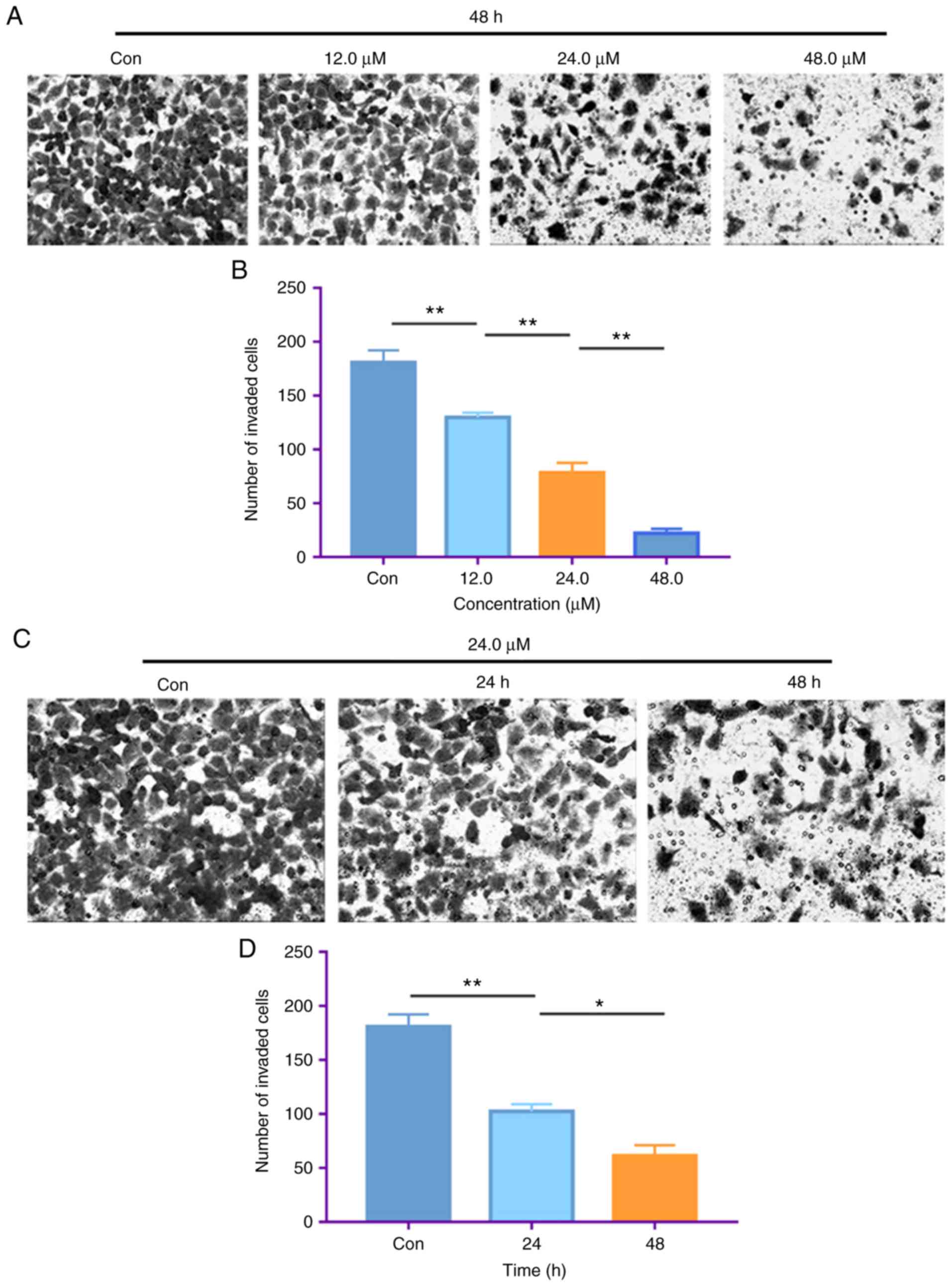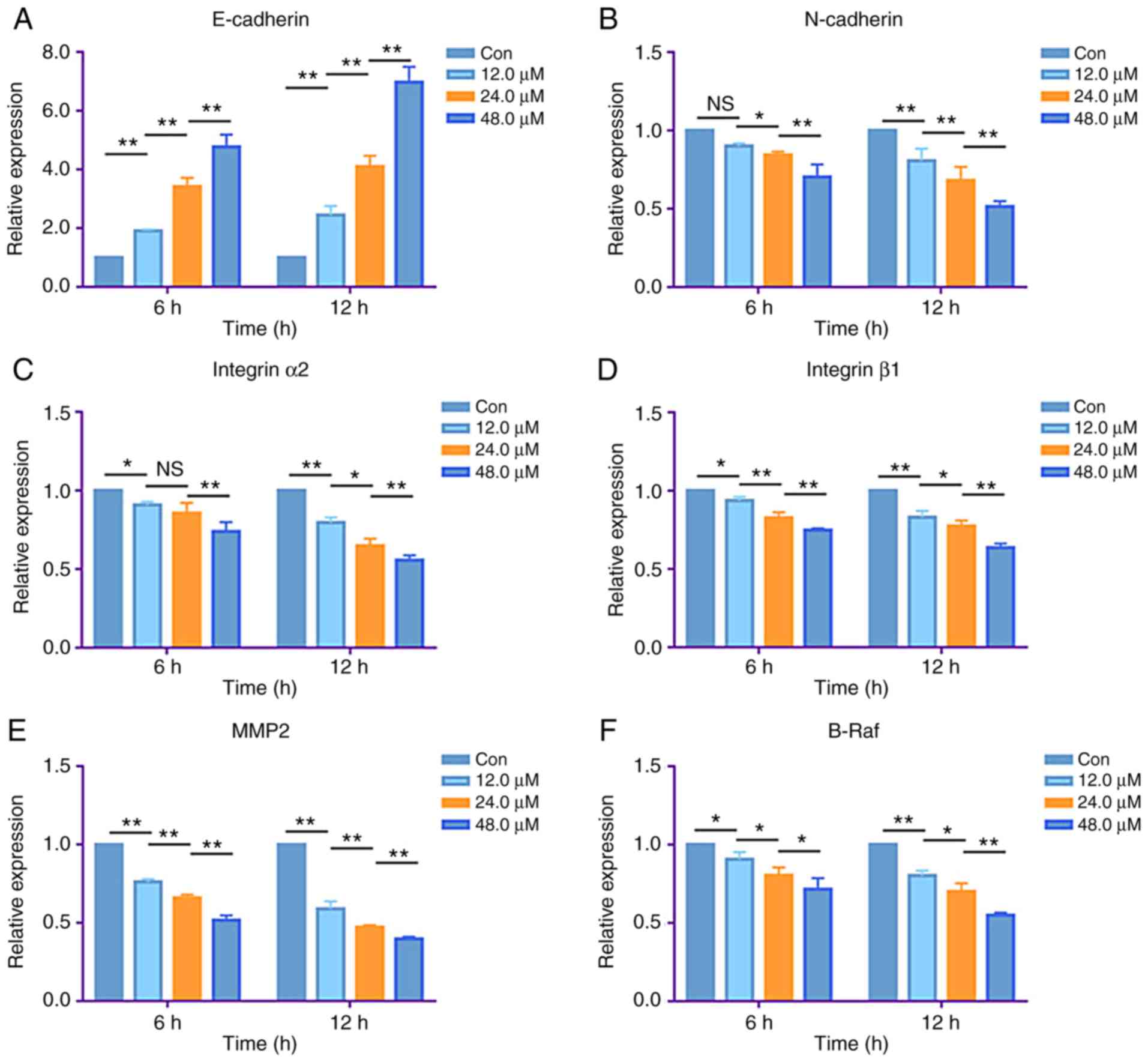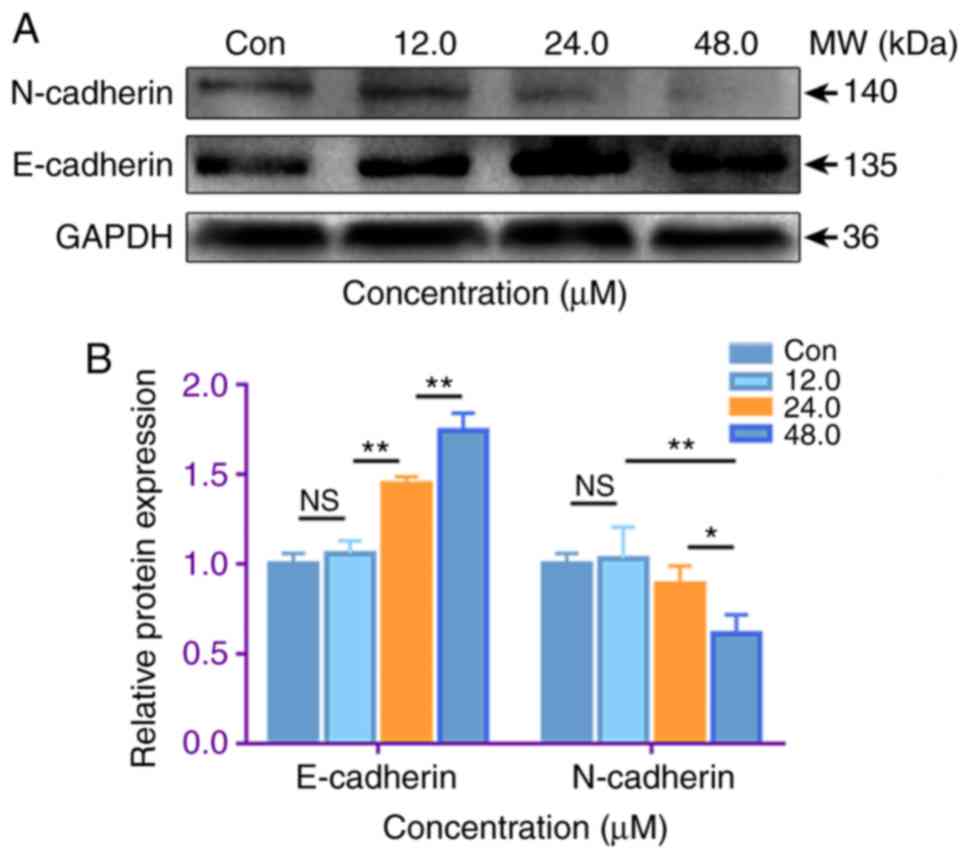|
1
|
Osmani L, Askin F, Gabrielson E and Li QK:
Current WHO guidelines and the critical role of immunohistochemical
markers in the subclassification of non-small cell lung carcinoma
(NSCLC): Moving from targeted therapy to immunotherapy. Semin
Cancer Biol. 52:103–109. 2018. View Article : Google Scholar
|
|
2
|
Siegel RL, Miller KD and Jemal A: Cancer
statistics, 2018. CA Cancer J Clin. 68:7–30. 2018. View Article : Google Scholar
|
|
3
|
Lin M, Tang S, Zhang C, Chen H, Huang W,
Liu Y and Zhang J: Euphorbia factor L2 induces apoptosis in A549
cells through the mitochondrial pathway. Acta Pharm Sin B. 7:59–64.
2017. View Article : Google Scholar
|
|
4
|
Zhang JY, Lin MT, Tung HY, Tang SL, Yi T,
Zhang YZ, Tang YN, Zhao ZZ and Chen HB: Bruceine D induces
apoptosis in human chronic myeloid leukemia K562 cells via
mitochondrial pathway. Am J Cancer Res. 6:819–826. 2016.
|
|
5
|
Yan YY, Bai JP, Xie Y, Yu JZ and Ma CG:
The triterpenoid pristimerin induces U87 glioma cell apoptosis
through reactive oxygen species-mediated mitochondrial dysfunction.
Oncol Lett. 5:242–248. 2013. View Article : Google Scholar
|
|
6
|
Li JJ, Yan YY, Sun HM, Liu Y, Su CY, Chen
HB and Zhang JY: Anti-cancer effects of pristimerin and the
mechanisms: A critical review. Front Pharmacol. 10:7462019.
View Article : Google Scholar :
|
|
7
|
Liu Y, Sun H, Makabel B, Cui Q, Li J, Su
C, Ashby CR Jr, Chen Z and Zhang J: The targeting of noncoding RNAs
by curcumin: Facts and hopes for cancer therapy (Review). Oncol
Rep. 42:20–34. 2019.
|
|
8
|
Cao K, Qian W, Xu Y, Zhou Z, Zhang Q and
Zhang X: A new sesquiterpenoid from Saussurea lappa roots. Nat Prod
Res. 30:2160–2163. 2016. View Article : Google Scholar
|
|
9
|
Rasul A, Yu B, Yang LF, Arshad M, Khan DM,
Ma T and Yang H: Costunolide, a sesquiterpene lactone induces G2/M
phase arrest and mitochondria-mediated apoptosis in human gastric
adenocarcinoma SGC-7901 cells. J Med Plants Res. 6:1191–1200.
2011.
|
|
10
|
Garayev E, Herbette G, Di Giorgio C,
Chiffolleau P, Roux D, Sallanon H, Ollivier E, Elias R and
Baghdikian B: New sesquiterpene acid and inositol derivatives from
Inula montana L. Fitoterapia. 120:79–84. 2017. View Article : Google Scholar
|
|
11
|
Park E, Song JH, Kim MS, Park SH and Kim
TS: Costunolide, a sesquiterpene lactone, inhibits the
differentiation of pro-inflammatory CD4(+) T cells through the
modulation of mitogen-activated protein kinases. Int
Immunopharmacol. 40:508–516. 2016. View Article : Google Scholar
|
|
12
|
Lee BK, Park SJ, Nam SY, Kang S, Hwang J,
Lee SJ and Im DS: Anti-allergic effects of sesquiterpene lactones
from Saussurea costus (Falc.) Lipsch. determined using in vivo and
in vitro experiments. J Ethnopharmacol. 213:256–261. 2018.
View Article : Google Scholar
|
|
13
|
Duraipandiyan V, Al-Harbi NA, Ignacimuthu
S and Muthukumar C: Antimicrobial activity of sesquiterpene
lactones isolated from traditional medicinal plant, Costus
speciosus (Koen ex.Retz.) Sm. BMC Complement Altern Med. 12:132012.
View Article : Google Scholar :
|
|
14
|
Kim DY and Choi BY: Costunolide-A
bioactive sesquiterpene lactone with diverse therapeutic potential.
Int J Mol Sci. 20:E29232019.
|
|
15
|
Rasul A, Parveen S and Ma T: Costunolide:
A novel anti-cancer sesquiterpene lactone (Review). Int J Oncol.
7:6–13. 2012.
|
|
16
|
Hua P, Zhang G, Zhang Y, Sun M, Cui R, Li
X, Li B and Zhang X: Costunolide induces G1/S phase arrest and
activates mitochondrial-mediated apoptotic pathways in SK-MES 1
human lung squamous carcinoma cells. Oncol Lett. 11:2780–2786.
2016. View Article : Google Scholar :
|
|
17
|
Cai H, He X and Yang C: Costunolide
promotes imatinib-induced apoptosis in chronic myeloid leukemia
cells via the Bcr/Abl-Stat5 pathway. Phytother Res. 32:1764–1769.
2018. View
Article : Google Scholar
|
|
18
|
Jeong SJ, Itokawa T, Shibuya M, Kuwano M,
Ono M, Higuchi R and Miyamoto T: Costunolide, a sesquiterpene
lactone from Saussurea lappa, inhibits the VEGFR KDR/Flk-1
signaling pathway. Cancer Lett. 187:129–133. 2002. View Article : Google Scholar
|
|
19
|
Das T, Safferling K, Rausch S, Grabe N,
Boehm H and Spatz JP: A molecular mechanotransduction pathway
regulates collective migration of epithelial cells. Nat Cell Biol.
17:276–287. 2015. View
Article : Google Scholar
|
|
20
|
Qin J, Tang J, Jiao L, Ji J, Chen WD, Feng
GK, Gao YH, Zhu XF and Deng R: A diterpenoid compound, excisanin A,
inhibits the invasive behavior of breast cancer cells by modulating
the integrin β1/FAK/PI3K/AKT/β-catenin signaling. Life Sci.
93:655–663. 2013. View Article : Google Scholar
|
|
21
|
Schmittgen TD and Livak KJ: Analyzing
real-time PCR data by the comparative C(T) method. Nat Protoc.
3:1101–1108. 2008. View Article : Google Scholar
|
|
22
|
Hamidi H and Ivaska J: Every step of the
way: Integrins in cancer progression and metastasis. Nat Rev
Cancer. 18:533–548. 2018. View Article : Google Scholar :
|
|
23
|
Hiraki M, Maeda T, Mehrotra N, Jin C, Alam
M, Bouillez A, Hata T, Tagde A, Keating A, Kharbanda S, et al:
Targeting MUC1-C suppresses BCL2A1 in triple-negative breast
cancer. Signal Transduct Target Ther. 3:132018. View Article : Google Scholar :
|
|
24
|
Kimani NM, Matasyoh JC, Kaiser M, Brun R
and Schmidt TJ: Antiprotozoal sesquiterpene lactones and other
constituents from tarchonanthus camphoratus and Schkuhria pinnata.
J Nat Prod. 81:124–130. 2018. View Article : Google Scholar
|
|
25
|
Yan Z, Xu T, An Z, Hu Y, Chen W, Ma J,
Shao C and Zhu F: Costunolide induces mitochondria-mediated
apoptosis in human gastric adenocarcinoma BGC-823 cells. BMC
Complement Altern Med. 19:1512019. View Article : Google Scholar :
|
|
26
|
Saosathan S, Khounvong J, Rungrojsakul M,
Katekunlaphan T, Tima S, Chiampanichayakul S, Berkland C and
Anuchapreeda S: Costunolide and parthenolide from Champi Sirindhorn
(Magnolia sirindhorniae) inhibit leukemic cell proliferation in
K562 and molt-4 cell lines. Nat Prod Res. 28:1–5. 2019. View Article : Google Scholar
|
|
27
|
Hu M, Liu L and Yao W: Activation of p53
by costunolide blocks glutaminolysis and inhibits proliferation in
human colorectal cancer cells. Gene. 678:261–269. 2018. View Article : Google Scholar
|
|
28
|
Pitchai D, Roy A and Banu S: In vitro and
in silico evaluation of NF-kB targeted costunolide action on
estrogen receptor-negative breast cancer cells-a comparison with
normal breast cells. Phytother Res. 28:1499–1505. 2014. View Article : Google Scholar
|
|
29
|
Ke B, Tian M, Li J, Liu B and He G:
Targeting programmed cell death using small-molecule compounds to
improve potential cancer therapy. Med Res Rev. 36:983–1035. 2016.
View Article : Google Scholar
|
|
30
|
Asati V, Bharti SK and Mahapatra DK:
Mutant B-Raf kinase inhibitors as anticancer agents. Anticancer
Agents Med Chem. 16:1558–1575. 2016. View Article : Google Scholar
|
|
31
|
Valastyan S and Weinberg RA: Tumor
metastasis: Molecular insights and evolving paradigms. Cell.
147:275–292. 2011. View Article : Google Scholar :
|
|
32
|
Zou Y, Wei J, Xia Y, Meng F, Yuan J and
Zhong Z: Targeted chemotherapy for subcutaneous and orthotopic
non-small cell lung tumors with cyclic RGD-functionalized and
disulfide-crosslinked polymersomal doxorubicin. Signal Transduct
Target Ther. 3:322018. View Article : Google Scholar :
|
|
33
|
Lyu Y, Xiao Q, Yin L, Yang L and He W:
Potent delivery of an MMP inhibitor to the tumor microenvironment
with thermosensitive liposomes for the suppression of metastasis
and angiogenesis. Signal Transduct Target Ther. 4:262019.
View Article : Google Scholar :
|















